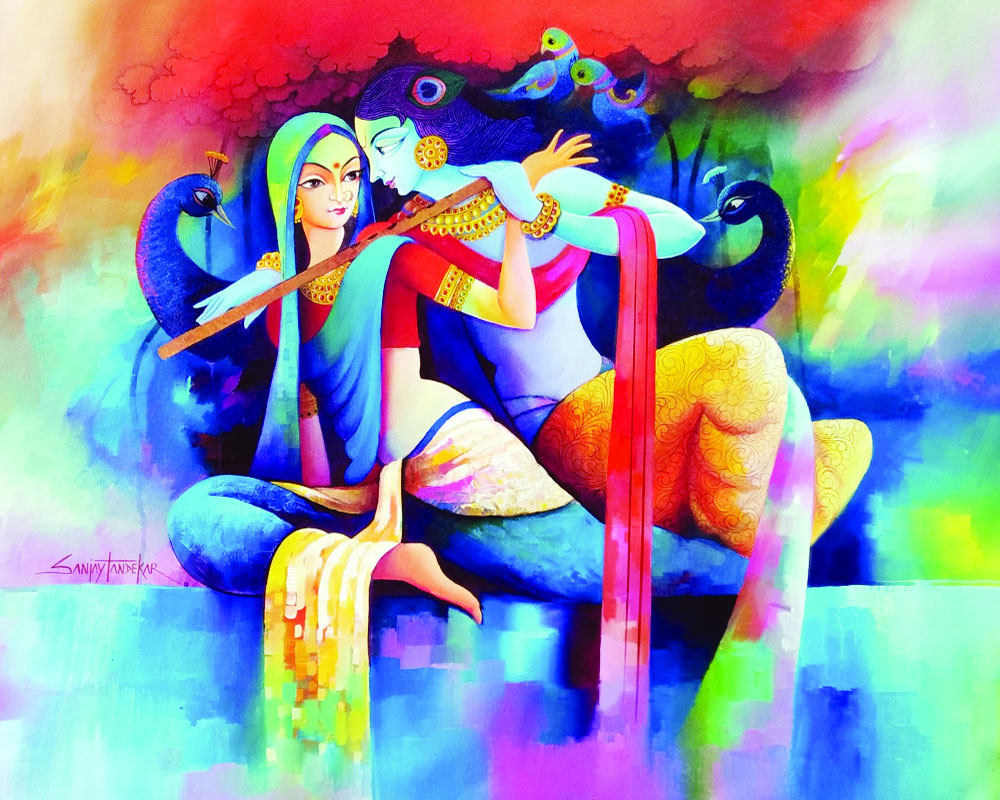Similarities between Hinduism’s Krishna and Christianity’s Jesus Christ show that basic principles of faith have universal appeal, says Dr Asha Goswami
It is interesting to note that there are many similarities which are commonly shared by two great personas in religions of the world — Shri Krishna and Christ. Both great Personas are similar in their names, have similarities in their teachings as well as in some of their life traits. It is learnt that the foreign missionary in India during the 18th and the 19th centuries found in Krishna, a peculiar Personae emerging from the nation’s myths. He sometimes resembled the Greek Sun God Apollo of great beauty. On other instances, it would touch the mythico-epic tradition of Indo-European people whose God Odin, too, has many analogies with Krishna. Much has been said on the issue of similarities between Krishna and Christ for the last two centuries. Hence, such views gave vent to the controversies among the scholars when some agree upon that the religion of Krishna or Krishnaism in its developed stage and form was a borrowed version of Christianity and similarly Krishna is a symbolic adaptation of Christ. Moreover, it is also held that striking similarity exists between childhood exploits of both of them and also among their teachings enshrined in Gita and Bible. This notion of similarity between Krishna and Christ was framed by foreign scholars when they challenged the historicity of the child god Krishna of the Puranas on the basis of the missing links which suggested that such a conception of the child god Krishna of Vrindavan-Gokul cannot be justifiably identified with the Vasudeva Krishna of the Mahabharata who was a Yadava Prince and had established kingdom far off at Dvaraka. Thus, it was thought that the concept of child cowherd Krishna is adapted from Christian belief of the child Christ. Let us then first ascertain the issue of the similarity that exists in their names which has been suggested on the grounds that the name Krishna is a corrupt form of the word Christ implying the sense of “The Savior”, and that makes clear why these both great men of world history befitting the role of the savior of the world have performed mostly such deeds which very well correspond to their names implying the sense of the saviors. To strengthen this point, it was also held that around first century AD, the Abhiras migrating from central Asia to Mathura might have brought with them the legends related to some boy god, which could be possibly be Christ’s earlier age acts. It is also thought that the notion of child Christ has similarity with the concept of the Abhiras’ Child God.
In order to make a thorough assessment of the issue, it may be emphasised that similarity assumed between Krishna and Christ mainly centers around a) similarity between their names; b) similarity between their early age deeds; and c)similarity between their teachings.
Now, with regard to the issue of the similarity between their names, it be ascertained that it is constructed on the basis of the fact that the Bengalis and Goanese mostly pronounce Krishna as Kushto or Krishto, and the Tamils pronounce Kitto or Kittu in place of Krishna. This very well explains the obvious similarity of sound between both the names Krishna and Christ. Next, with regard to the view that the childhood events of Krishna agree with the Christian traditions, it be cited that there exists similarly between their childhood events/exploits. For instance, Herod’s massacre of innocents can be well compared with massacre of all newly born boys by Kansa at Mathura. Child Christ’s flight to Egypt be found similar with child Krishna’s flight to Gokul. Christ being the fore-runner in St John can be well compared with Krishna always being accompanied by his elder brother Balarama. Krishna and Christ both are said to be descendants of the royal clan. Both grew up in a stable. Both of them were worshiped by cowherds and the shepherds. Moreover, tales like restoring the life of the son of a bewailing woman by Christ, Christ’s pouring of a box of anointment, and Christ’s healing of a crippler are quite similar to Krishna’s exploits. Also, a new and different role was assigned by the Puranas to the Krishna of the Mahabharata. He was asked to be a great teacher and a warrior. This, too, is assumed to bear an impact of Christian notions. So, it was assumed that the later Puranic narratives referring to such a changed Personae of Krishna may have borrowed from Christian narratives. Hence, a sudden transformation in the character of Krishna of the Mahabharata as a child god of Gokula and Vrindavana is held to bear the impression of the child Christ. So much assumption of similar features in their traditions goes that even the dual motif of Radha Krishna is traceable in the Christian tradition of Virginia and Paul. Besides, similarity is also cited between the word Yadava, Arjuna and Durvasa of the Krishna legend and those of Christian traditions like Juda, John and Peter. Likewise, interaction of Krishna’s Gita teachings with Christianity is assumed by citing analogy between Gita maxims and the maxims in Bible. Besides, there also exists similarity of concepts such as faith or shraddha and bhakti in both systems of belief.
While summing up the ideas on the issue of similarity between the names Krishna and Christ and the parallels of thoughts in their teachings and some of the analogical traits in their childhood episodes, it be ascertained that ‘these are justified as reflecting a common fount of oriental thoughts, traditions and ideologies as well as the conceptions which further developed into different traditions that follow the lives of Krishna and Christ. Although there exists phonetic similarity between both the names, it is obviously certain that Krishna is a native Indian name and Christ is a Greek word’.
The views expressed are the writer’s


























